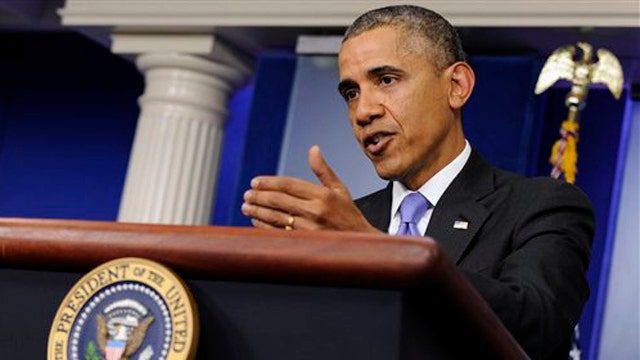A damaging scandal for the President
Andrea Tantaros with the latest on the Veterans Affairs scandal
President Obama is mad as hell. The media are mad as hell. The veterans are mad as hell. We’re all mad as hell.
The journalistic uproar about the VA hospital mess has been loud and forceful, with even such liberal columnists as Dana Milbank and Gene Robinson saying this is a real, genuine, big-deal scandal—and not letting Obama off the hook.
Once again, we saw the president in reactive mode. Once again, defending an aide who didn’t seem to have control of his department. Once again, saying he didn’t know about some outrage until he heard about it from the media.
To be sure, the VA health system has been a disaster for decades. The waiting times have been terrible as Iraq and Afghanistan veterans have flooded the hospitals. But it was the media’s discovery of secret waiting lists at the Phoenix hospital, and mounting problems at other facilities, that caused this to explode.
All too typically, the Beltway press has turned this into a game of whether or not Eric Shinseki will resign. Obama still seems in “heckuva job” mode, though he did leave the door ajar for the Veterans secretary to conclude he needs to bow out.
But especially in the wake of the ObamaCare fiasco, this is ultimately about the president: Can he manage this sprawling government or not?
And the question for the press is: Can Obama be held accountable?
What, for example, do his media allies say now? Is there a case to be made that Obama isn’t to blame?
The New Republic’s Jonathan Cohn offers a sympathetic assessment:
“Everybody in Washington seems angry. For a change, they should be.
“But angry at whom? It's hard to be sure right now. Conservatives say this story is proof that big government bureaucracies are prone to failure—and that Obama has failed to create the ‘21st Century V.A.’ he promised as a candidate. Both claims seem credible but, even together, they also seem incomplete. The process for getting veterans into the government's health system—and then getting them seen by VA medical professionals—has a long history of problems, dating back decades. And while the Obama administration obviously hasn't solved them, it's presided over significant improvements in these and other areas of veterans services—at a time when the need for care from wounded veterans is growing.”
As Cohn acknowledges, the GAO warned back in 2001 that wait times at VA clinics were excessive and dangerous (and that, of course, was the dawn of the Bush administration). Plus, it was candidate Obama who said in 2008 that the VA waiting times were “an outrage” and “a betrayal…of the ideals that we ask our troops to risk their lives for.”
But Cohn argues that “the administration has done a lot more than the tone of the current media frenzy might suggest. The transition from paper to electronic eligibility records is underway. That application backlog is down by 44 percent, at least according to official figures. Meanwhile, the administration has eased eligibility for victims of Agent Orange and post-traumatic stress disorder—changes veterans advocates had sought for decades.”
Well, maybe. But progress in some areas doesn’t alter the fact that some patients have died during horrendously long wait times. We’re talking real suffering by real people.
Politics is about perception, and the perception right now is that the VA has careened out of control.
Liberal Time columnist Joe Klein is tougher on the White House:
“The question is, How do we change this situation? The simple answer is leadership, which is why some have called (as I did last year) for VA Secretary Eric Shinseki to resign. By all accounts, Shinseki is a fine man who has spent nearly six years lost in the system. An effective leader would have gone to Phoenix as soon as the scandal broke, expressed his outrage, held a town meeting for local VA outpatients and their families—dealt with their fury face-to-face—and let it be known that he was taking charge and heads were going to roll. Instead, Shinseki intoned the words ‘mad as hell’ at a congressional hearing. And White House chief of staff Denis McDonough said the president was ‘madder than hell’ about the situation. Does anyone actually find this convincing?
“The president cares deeply about the troops; he visits the wounded in the hospitals all the time; it’s just not his style to make a public deal of it. But he has been sadly ineffective on the veterans–health issue.”
On MSNBC, Rachel Maddow objected to the tone of the coverage:
“I feel like so much of the ‘this is a scandal’ coverage is covering this as if this is a totally new problem, as if something like this has never happened before…
“It feels to me like it’s the media coming upon a problem in progress and calling it a scandal, rather than something brand new being uncovered.”
Her guest, Paul Rieckhoff, founder of Iraq and Afghanistan Veterans of America, called the latest revelations “a wakeup call. I mean honestly, I thought this was going to happen years ago. People are complaining that this has been politicized in the last couple of weeks. 5:36 It’s a miracle it wasn’t politicized four years ago… You’ve been very aggressive and consistent in covering it, but the reality is that most of American and most of the media has not been so welcome to the discussion.”
If that’s the case, you now have our full attention. Will the media stay with the story of how badly our vets have been mistreated until there are real reforms? Or will it be a typical Washington storm that lasts only until someone is fired and the press moves on to the next scandal?













































